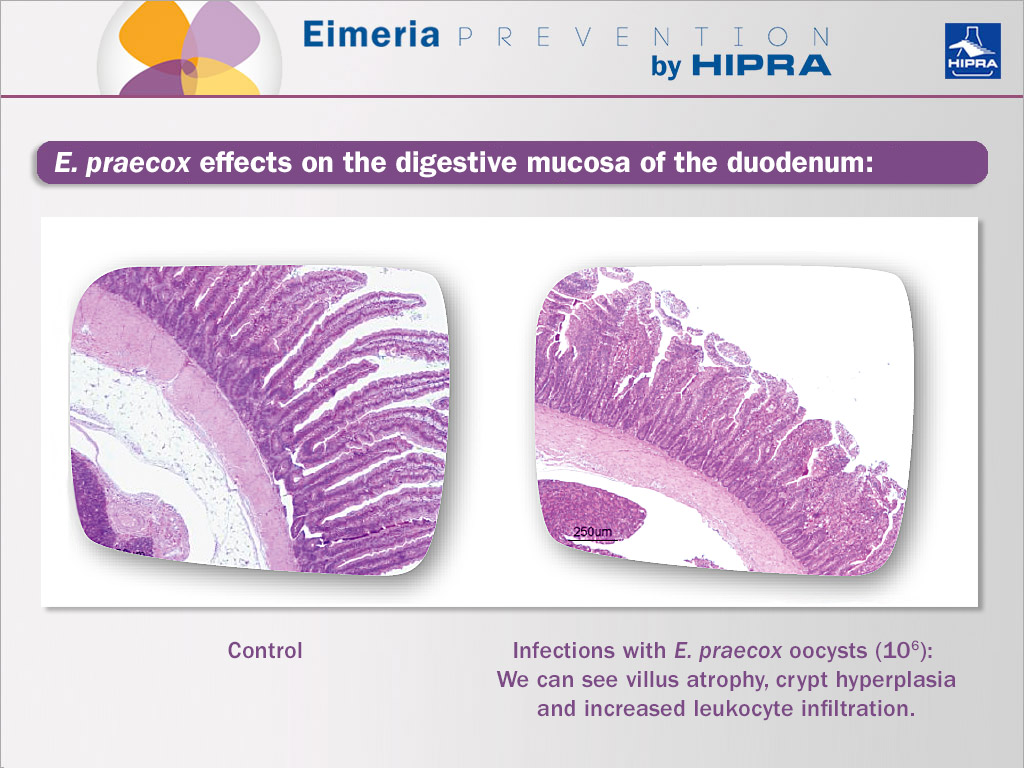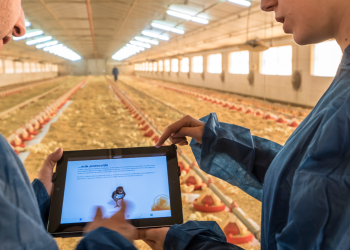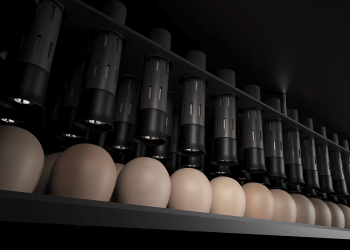The fight against coccidiosis in chickens means the adoption of different strategies depending of the type of bird. If we are managing long life cycle birds, we have to pay special attention to clinical Eimeria species that are able to generate a real coccidiosis process with macroscopic lesions and symptoms that will reduce the healthy status of the birds and will compromise the development of immunity against other diseases or cause the death of the birds.
However, when we are rearing standard, certified or even free-range broilers, the focus needs to be a different one. In these cases it will be difficult to find real clinical coccidiosis. Otherwise, the “silent” species – such as Eimeria praecox among others – will affect the intestinal mucosa and will reduce the capacity of a broiler for nutrient absorption. Dealing with subclinical species is essential in coccidiosis in chickens with a high growth rate.
For a long time, there was a trend to classify coccidiosis in chickens according to the age of the birds. It was considered that E. acervulina, E. maxima and E. tenella were species affecting all the birds. In the case of long life cycle birds such as breeders and layers, it was necessary to include E. necatrix and E. brunetti in the composition of vaccines against coccidiosis. Indeed, this is true for long life cycle birds because feed conversion and growth is important, but not the key point. In fact, these birds are reared under feed restriction.
The chicken intestine has a very important part that plays a main role in digestion and absorption of nutrients. This is the duodenum.
The duodenum is a part of the small intestine where the main digestive processes occur. The pancreas will provide digestive juices into the duodenum for protein digestion in particular and the liver (via the gall bladder) will produce the bile, a gastric juice involved in the digestion of lipids and absorption of vitamins A, D, E and K. When we are treating coccidiosis in chickens –and more specifically in fattening broilers- it is essential to identify the species of Eimeria located in this part of the intestine.
E. acervulina, one of the most prevalent species in broilers, prefers this part of the intestine even if the level of infection is moderate. It is quite typical to find the white ladder-like spot lesions scattered and confined to the duodenum:
E. praecox is also located in the duodenum. For a long time, E. praecox was considered to be a non-pathogenic strain. After the studies by Williams et al. (2009), the pathogenicity of E. praecox was demonstrated. There are two facts to consider with regard to the damage caused by E. praecox in coccidiosis in chickens:
- On the one hand, praecox causes microscopic damage in the cells of the duodenum. In infections with E. praecox oocysts (106) it is possible to see villus atrophy, crypt hyperplasia and increased leukocyte infiltration.
- On the other hand, praecox modifies the viscosity of the liquids in the duodenum. In infections with E. praecox an increase in whitish mucus and non-digested feed is observed.
Finally, in other studies carried out by Répétant et al. 2011, the impact of the infection caused by E. praecox was related to the infective dose but its impact on performance was present from the lowest dose of 5,000 oocysts/bird when it was co-administered with E. acervulina.
After all these arguments it seems of great importance to include Eimeria praecox as a target in the fight against coccidiosis in chickens in fattening birds where the integrity of the duodenum is a must. This is the reason why in the design of the composition of HIPRACOX® it was decided to include E. praecox together with E. mitis to protect against the effects of subclinical coccidiosis in chickens.
REFERENCES:
- Répérant J.M., Dardi M., Pagès M., Thomas-Hénaff M., 2012. Pathogenicity of Eimeria praecox alone or associated with Eimeria acervulina in experimentally infected broiler chickens. Veterinary Parasitology 187, 333-336.
- Williams R.B., Bushell A.C., Répérant J.M., Doy T.G., Morgan J.H., Shirley M.W., Yvoré P., Carr M.M., Frémont Y., 1996. A survey of Eimeria species in commercially-reared chickens in France during 1994. Avian Pathol. 25, 113-130.




